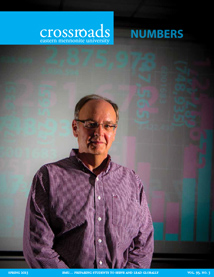
Trevor Bare ’06
One of the most desirable jobs in the United States – being an actuary – has attracted exactly three graduates from EMU, as far as we know. (You’re another one? Let us know at Crossroads@emu.edu.)
Christopher Wampole ’96 was the first to achieve the coveted status of Fellow of the Casualty Actuarial Society, passing the last of nine brutally tough exams in 2007, six years after he took his first actuarial exam on the route of property and casualty actuarial work.
John Mark Nussbaum ’83 completed his eight exams, plus 12 required modules, in March of 2013, after investing about 3,500 hours to complete the testing on the route of life, health and pension actuarial work. (And this is someone who already held two impressive credentials – Certified Public Accountant and Certified Financial Analyst.)
Trevor Bare ’06 has made it through the first level of credentialing. After passing seven exams, he became an “associate” in the Society of Actuaries. Bare also passed two additional exams to be credentialed as an “enrolled actuary.” He has two more to go to be a “fellow.” Bare is a retirement actuary.
Given that the easier actuary exams may take 200 to 300 hours of prep time, and the harder ones as much as 400 hours of intensive study – amounting to a self-directed graduate program – why would anyone subject himself to such an ordeal? Because, by all accounts, the reward is enjoying a job that pays well, has regular hours that rarely exceed 40 weekly, and is low stress. 1
With only about 20,000 actuaries in the United States, the profession is not widely known by those outside the field. Basically, an actuary is the person who works behind the scenes, usually on behalf of the insurance industry (calculating the risks that underlie the sums charged for premiums) and of employers who need sound data to design pension and benefit plans, evaluate assets and liabilities, and generally deal with risk. Some actuaries do government work, helping ensure compliance with regulatory laws.
“You have to love math to do this work,” says Nussbaum, who holds a degree in accounting from EMU and an MBA from Ohio State. “And you need good analytical thinking.” Nussbaum liked his math courses at EMU, but didn’t want to be a math teacher. Unaware of the actuary career option, he majored in accounting and then spent 25 years working for what is now called Everence.
In 2005, he stopped managing Everence’s portfolios and investments and embarked on a new career path by becoming an actuarial assistant there. In January 2013, just before becoming Fellow of the Society of Actuaries, he accepted a position at the headquarters of RGA Reinsurance Company in Chesterfield, Missouri.
Christopher Wampole also took a circuitous route to being an actuary. Several years after majoring in math at EMU, he entered the architecture program at Ohio State. But architecture proved to be less interesting to him than another field he discovered at that university, actuarial science. Learning that a motivated person could study on his own and pass the exams without paying for schooling, that’s what Wampole did between 2001 and 2007 (which is about as fast as anyone can pass all of the exams – many people take up to 10 years). Erie Insurance in Pennsylvania hired Wampole after he passed his first exam, and he has been there ever since.
Of the three alumni-actuaries, only Trevor Bare took a direct path into his work. As a prospective student, Bare met with Owen Byer, who would become one of Bare’s math professors. Byer suggested that the young man’s interest in mathematics and economics might make him well suited to being an actuary. After his junior year at EMU, Bare interned at Conrad Siegel Actuaries in Harrisburg, Pennsylvania – where the company slogan is “up to the challenge, down to the numbers.” This led to a permanent job at Conrad Siegel after Bare graduated.
“We specialize in consulting for retirement plans, investments, health insurance plans, and other employee benefits,” Bare says. “How much do they need to set aside? Are they over- or under-funded?”
The Conrad Siegel website puts it this way: “Employee benefits are all about numbers. As actuaries, we have those numbers down to a science. With that knowledge, we craft streamlined solutions to your biggest benefits challenges.”
Bare says he enjoys the complexity and variety of his work, which may range from lawyerly study of the tax code to doing mathematical calculations to working with programmers on developing internal software.
Wampole says his company typically hires summer interns and pays them well. To garner an internship, it helps to have studied for or passed at least one actuarial exam. Wampole suggests that undergraduates interested in this path might find it helpful to form a club, where they could support each other as they work through sample actuarial exams and course material available online.
It won’t be easy, but the reward might be securing “a great job,” says Wampole. “I really enjoy myself.” — Bonnie Price Lofton, MA ’04
1. “Experienced Fellows have the potential to earn from $150,000 to $250,000 annually, and many actuaries earn more than that,” says the “be an actuary” webpage sponsored by the Casualty Actuarial Society and Society of Actuaries. (Each society has its own exam track.) “It could take from 6-10 years to pass all of the exams, but you can begin a career as an actuary by passing the first two exams, and then taking subsequent exams while working as an actuarial assistant.” In addition to the substantial pay, actuaries hover at the top the career list in terms of satisfaction with work environment, employment outlook, physical demands and stress, according to a Jan. 10, 2010, report in the Wall Street Journal.
